NJ Teachers of English to Speakers of Other Languages/
NJ Bilingual Educators
ARTICLES FALL 2022
Meet New Executive Board Members
Meet More of Our New Executive Board Members
6 Strategies to Engage Long-Term English Learners– Carissa Ford
7 Strategies for Reading Success with English Learners– Rebecca Salinas
2023 Spring Conference Call for Proposals
2023 Spring Conference Information
Games in the Classroom– Gina Finneran
How to Use Gameplay to Enhance Classroom Learning– Hoa P. Nguyen
Engaging MLs in Daily Academic Conversations– Jenny Vo
5 Problems to Avoid With Role Play in EFL/ESL + Solutions– Will
Share Your Success! Call for Proposals for the Spring Conference
Possible Proposal Topics for the Spring Conference
Spring Conference Keynote Speakers
Let’s Talk Turkey: 10 Traditional Thanksgiving Activities for ESL Students– Susan Verner
5 Handy Go-to Conversation Questions for the ESL Classroom– Susan Verner
Trying it out – Using Imitation for Fluency and Vocabulary– Marilyn Pongracz
Identity and Getting to Know Your Students– Lindsay Bosley
Students Know Themselves Best– Anne Tacinelli
Literacy and New MLLs in U.S. Elementary Schools– Judie Haynes
Characteristics of Students From Non-Literacy-Oriented Homes– Judie Haynes
Looking at and Learning about the WIDA 2020 Standards Framework with NJTESOL/NJBE
Padres con Poder/Parent Power Workshops
Call for Submissions to the Annual Voices Journal
September 27, 2022
Meet New Executive Board Members
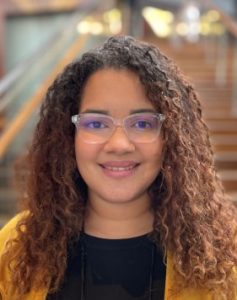 Mary Callirgos, Graduate Student Special Interest Group Representative As I begin my 8th year teaching, I am super excited to continue my passion of lifelong learning in my new role as graduate student representative with NJTESOL/NJBE. I have been with the organization since 2015 and in 2019 I joined the Passaic County Chapter as Co-chair. I am currently at WPUNJ obtaining my certification for the Bilingual/Bicultural endorsement. After obtaining my MA. Ed in Curriculum and Instruction I knew that I wanted to not only teach ELLs but enter into the Bilingual world. I taught ESL for 6 years before becoming a bilingual teacher. What I have learned is that our students have unique stories and experiences. We should all embrace our differences and learn from each other. I would love to connect with educators who are taking graduate credits for ESL and Bilingual endorsements to help support one another. So join our GroupMe to connect today!
Mary Callirgos, Graduate Student Special Interest Group Representative As I begin my 8th year teaching, I am super excited to continue my passion of lifelong learning in my new role as graduate student representative with NJTESOL/NJBE. I have been with the organization since 2015 and in 2019 I joined the Passaic County Chapter as Co-chair. I am currently at WPUNJ obtaining my certification for the Bilingual/Bicultural endorsement. After obtaining my MA. Ed in Curriculum and Instruction I knew that I wanted to not only teach ELLs but enter into the Bilingual world. I taught ESL for 6 years before becoming a bilingual teacher. What I have learned is that our students have unique stories and experiences. We should all embrace our differences and learn from each other. I would love to connect with educators who are taking graduate credits for ESL and Bilingual endorsements to help support one another. So join our GroupMe to connect today!
 Andrew Sansone,Adult Education Special Interest Group Representative I am currently working in Jersey City at Saint Peter’s University as the Director of the University’s Families for Literacy program, an adult ESOL program for community members. Besides my work with NJTESOL, I help to administer a local adult ESOL services provider working group and serve as TESOL International’s co-chair for its Adult Education Interest Group. I hold an MA TESOL from the Middlebury Institute of International Studies at Monterey, California with a specialization in Language Program Administration.
Andrew Sansone,Adult Education Special Interest Group Representative I am currently working in Jersey City at Saint Peter’s University as the Director of the University’s Families for Literacy program, an adult ESOL program for community members. Besides my work with NJTESOL, I help to administer a local adult ESOL services provider working group and serve as TESOL International’s co-chair for its Adult Education Interest Group. I hold an MA TESOL from the Middlebury Institute of International Studies at Monterey, California with a specialization in Language Program Administration.
 Lisa Lane, Ed.D., Social Media Coordinator I currently hold the position of Supervisor of Literacy and ELL in the Jackson Township Public Schools. I have 29 years of experience at the elementary, secondary, and university levels and am passionate about multilingual learners, curriculum and instruction, and professional development. Within the scope of my current position in Jackson, I also oversee the Mentoring and Teacher Leader Programs. Working with teachers brings me so much joy as I love to collaborate with others and plan professional learning across the content areas. Prior administrative experience includes holding positions as an assistant principal, director/supervisor of special services, LDT-C, special education teacher and adjunct professor at Monmouth University. In 2000, I graduated from Teachers College, Columbia University as a Doctor of Education with a publication in Conflict Resolution and Gender Studies. This year, I am so excited to join NJTESOL/NJBE Executive Board as the Social Media Coordinator and look forward to working with such a talented and dedicated group of professionals.
Lisa Lane, Ed.D., Social Media Coordinator I currently hold the position of Supervisor of Literacy and ELL in the Jackson Township Public Schools. I have 29 years of experience at the elementary, secondary, and university levels and am passionate about multilingual learners, curriculum and instruction, and professional development. Within the scope of my current position in Jackson, I also oversee the Mentoring and Teacher Leader Programs. Working with teachers brings me so much joy as I love to collaborate with others and plan professional learning across the content areas. Prior administrative experience includes holding positions as an assistant principal, director/supervisor of special services, LDT-C, special education teacher and adjunct professor at Monmouth University. In 2000, I graduated from Teachers College, Columbia University as a Doctor of Education with a publication in Conflict Resolution and Gender Studies. This year, I am so excited to join NJTESOL/NJBE Executive Board as the Social Media Coordinator and look forward to working with such a talented and dedicated group of professionals.
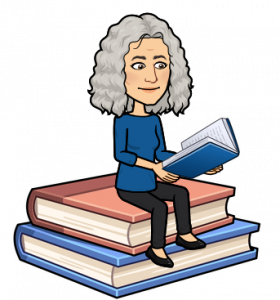 Hana Prashker, Liaison I am an ELL teacher in grades 6-12 In Hasbrouck Heights Middle School and High School. I was the ESL Secondary SIG Representative for four years previously, as well as the Bergen County Chapter Co-Chair and Chair. I hope, as Liaison to TESOL and NABE, that I can showcase NJTESOL/NJBE members and encourage our members to interact with these amazing organizations. With our present sister affiliate NYS TESOL, I hope that we can work together to accomplish more for our teachers and students. As Chapter Liaison, I encourage the present chapter leaders to continue the programming and networking of teachers in our counties on a local and state level. If anyone is interested in becoming a County Chapter leader, please email me at liaison@njtesol_njbe.org.
Hana Prashker, Liaison I am an ELL teacher in grades 6-12 In Hasbrouck Heights Middle School and High School. I was the ESL Secondary SIG Representative for four years previously, as well as the Bergen County Chapter Co-Chair and Chair. I hope, as Liaison to TESOL and NABE, that I can showcase NJTESOL/NJBE members and encourage our members to interact with these amazing organizations. With our present sister affiliate NYS TESOL, I hope that we can work together to accomplish more for our teachers and students. As Chapter Liaison, I encourage the present chapter leaders to continue the programming and networking of teachers in our counties on a local and state level. If anyone is interested in becoming a County Chapter leader, please email me at liaison@njtesol_njbe.org.
October 4, 2022
Meet More of Our New Executive Board Members
 Soyoun Ouh ESL Secondary Special Interest Group Representative I am currently in my 8th year teaching at the North Plainfield School District as an ESL Teacher. I have a Masters in K-12 ESL Education from Rutgers University and I am also one of the Somerset-Hunterdon County Chapter leaders at NJTESOL-NJBE. I have been a part of this organization since grad school and since then have participated in both attending and volunteering for our Spring Conference. Through the mentorship and encouragement of other board members and fellow educators, I am honored to be a part of this community. Just as we advocate and support our students in our schools and classrooms, I hope to be an advocate and a support to the members at NJTESOL-NJBE. I look forward to collaborating and connecting with you all.
Soyoun Ouh ESL Secondary Special Interest Group Representative I am currently in my 8th year teaching at the North Plainfield School District as an ESL Teacher. I have a Masters in K-12 ESL Education from Rutgers University and I am also one of the Somerset-Hunterdon County Chapter leaders at NJTESOL-NJBE. I have been a part of this organization since grad school and since then have participated in both attending and volunteering for our Spring Conference. Through the mentorship and encouragement of other board members and fellow educators, I am honored to be a part of this community. Just as we advocate and support our students in our schools and classrooms, I hope to be an advocate and a support to the members at NJTESOL-NJBE. I look forward to collaborating and connecting with you all.
 Leah Carmona Higher Ed Special Interest Group Representative I am an assistant professor in the ESL/ALP program at Bergen Community College in Paramus, NJ, and I teach grammar, reading, writing, and TOEFL prep. I have taught ESL in higher education for more than 15 years, and in recent years, I have been a member of our learning communities, so I have taught paired courses, such as Reading 3 & Sociology. I believe that my experience growing up in South America and having to learn English as a second language has enabled me to relate to my students’ experiences when learning a new language. Therefore, my purpose when working together is to focus on strategies to help them integrate and succeed in an academic environment and the workplace. As the higher-education representative for NJTESOL/NJBE, I hope to connect with 2-year and 4-year colleges and universities to share our experiences while working with ESL students to ensure persistence and degree completion.
Leah Carmona Higher Ed Special Interest Group Representative I am an assistant professor in the ESL/ALP program at Bergen Community College in Paramus, NJ, and I teach grammar, reading, writing, and TOEFL prep. I have taught ESL in higher education for more than 15 years, and in recent years, I have been a member of our learning communities, so I have taught paired courses, such as Reading 3 & Sociology. I believe that my experience growing up in South America and having to learn English as a second language has enabled me to relate to my students’ experiences when learning a new language. Therefore, my purpose when working together is to focus on strategies to help them integrate and succeed in an academic environment and the workplace. As the higher-education representative for NJTESOL/NJBE, I hope to connect with 2-year and 4-year colleges and universities to share our experiences while working with ESL students to ensure persistence and degree completion.
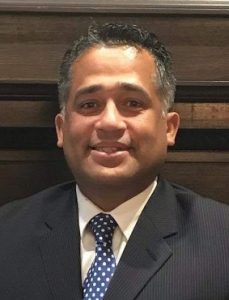 Dr. Alex Guzmán Teacher Ed Special Interest Group Representative Dr. Alex Guzmán earned his doctorate in Education Leadership from Saint Elizabeth University, researching emergent bilingual student experiences and programs. His career in education started as a chemistry and physics teacher in urban and suburban communities. He earned his B.S. in chemistry and minored in secondary education from New Jersey City University. Then he continued his education at Montclair State University, earning an M.A. in Administration and Supervision and transitioning to education administration as Supervisor of STEM, Director of Curriculum, and High School Principal. After 22 years in K-12 education, he continues his research agenda at Kean University’s College of Education, School of Curriculum & Teaching: Bilingual Education, focusing on preparing pre-service and in-service teachers to provide equitable learning experiences for emergent bilingual students and increasing ethno-racial diversity of the teacher workforce.
Dr. Alex Guzmán Teacher Ed Special Interest Group Representative Dr. Alex Guzmán earned his doctorate in Education Leadership from Saint Elizabeth University, researching emergent bilingual student experiences and programs. His career in education started as a chemistry and physics teacher in urban and suburban communities. He earned his B.S. in chemistry and minored in secondary education from New Jersey City University. Then he continued his education at Montclair State University, earning an M.A. in Administration and Supervision and transitioning to education administration as Supervisor of STEM, Director of Curriculum, and High School Principal. After 22 years in K-12 education, he continues his research agenda at Kean University’s College of Education, School of Curriculum & Teaching: Bilingual Education, focusing on preparing pre-service and in-service teachers to provide equitable learning experiences for emergent bilingual students and increasing ethno-racial diversity of the teacher workforce.
October 10, 2022
6 Strategies to Engage Long-Term English Learners
By Carissa Ford
 Long-term English Learners (LTELs) have been classified as English language learners for more than 6 years in a U.S. school system. These learners seem to be orally fluent but may lack the academic vocabulary and writing skills needed to succeed. The author, Carissa Ford, lists six strategies that may benefit these students.
Long-term English Learners (LTELs) have been classified as English language learners for more than 6 years in a U.S. school system. These learners seem to be orally fluent but may lack the academic vocabulary and writing skills needed to succeed. The author, Carissa Ford, lists six strategies that may benefit these students.
- Talk to each student individually. Ask them about their goals and what they think about the importance of learning. Let them know about the types of assistance they can receive at school.
- Be consistent in your classroom with routines. Knowing what is expected of them avoids confusion and helps students focus on their learning.
- Provide and analyze examples of academic language and writing to help students move past the every-day vocabulary they learn in conversation.
- Explicitly teach language forms and functions. Ford recommends that this be taught through direct instruction, sentence frames, and word banks.
- Activate and build background knowledge and vocabulary to improve students’ understanding of the given topic.
- Structure interactions among students. Teachers can have high expectations for students as they monitor group work and offer immediate feedback.
Ford closes by acknowledging that these strategies are good for all students at all levels.
Contributed by Hana Prashker, NJTESOL/NJBE Liaison Here are the details.
7 Strategies for Reading Success with English Learners
By Rebecca Salinas
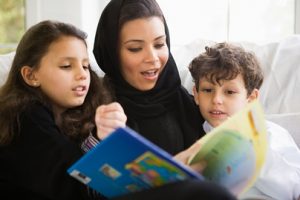 In a related article to the one above, Rebecca Salinas first lists five stages of reading enjoyment, which are essential for success.
In a related article to the one above, Rebecca Salinas first lists five stages of reading enjoyment, which are essential for success.
Stage 1 – having fun with picture books and nursery rhymes
Stage 2 – sharing an experience with the characters
Stage 3 – relating to the characters to better understand personal situations
Stage 4 – learning and comprehension
Stage 5 – viewing literature as art
According to Salinas, the problem is that in school, teachers start at stage 4. Her 7 strategies provide a means to step back through these stages so students will become avid readers.
Strategy 1 – Engage in oral storytelling to develop interest in stories.
Strategy 2 – Encourage students to read bilingual books to improve literacy in both languages.
Strategy 3 – Have students listen to audio books to increase their vocabulary and comprehension
Strategy 4 – Let students choose what is interesting to them.
Strategy 5 – Make readable and interesting books readily available.
Strategy 6 – Prepare students for reading by supplying background knowledge and vocabulary.
Strategy 7 – Talk to families about reading with their children in English or their own language.
You can find the specifics here.
October 18, 2022
2023 Spring Conference Call for Proposals
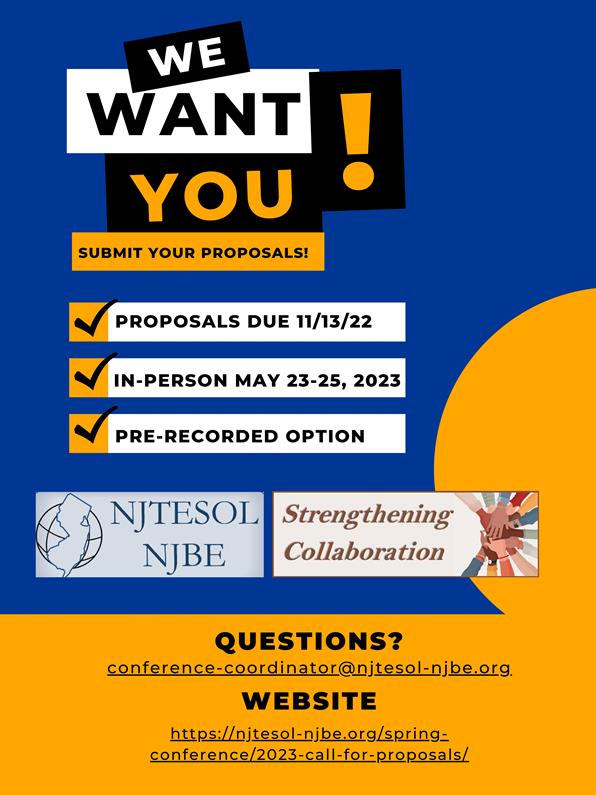
Presenters are the foundation of our conference. We encourage everyone, members and non-members, to take advantage of the opportunity to share your expertise, tried-and-true teaching strategies, as well as new skills you have learned. You can do this by submitting a proposal. We invite proposals that will strengthen collaboration to support our students, their families, educators, support staff, and the communities in which we work and live. Collaboration is at the core of our work.
2023 Spring Conference Information
Our 2023 conference has two components to choose from: In-Person Conference – May 23, 24, & 25 – Tuesday, Wednesday, & Thursday Hyatt Regency Hotel, New Brunswick OR Video Library Conference – Access starting on May 26th
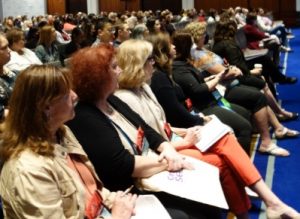 The In-Person Conference will take place at the Hyatt Regency, New Brunswick on May 23, 24, & 25. You can register for one, two or all three days. We have three fantastic keynotes scheduled to present at the conference. Select from many presentations approved for the continuing education requirement. Network with other colleagues! Obtain the latest information on state and national initiatives. Visit and meet with the representatives at our Sponsor & Exhibitors booths to find the latest and greatest teaching tools. Earn PD Hours throughout the day. You can also enjoy coffee with the sponsors and exhibitors starting at 7:30 am.
The In-Person Conference will take place at the Hyatt Regency, New Brunswick on May 23, 24, & 25. You can register for one, two or all three days. We have three fantastic keynotes scheduled to present at the conference. Select from many presentations approved for the continuing education requirement. Network with other colleagues! Obtain the latest information on state and national initiatives. Visit and meet with the representatives at our Sponsor & Exhibitors booths to find the latest and greatest teaching tools. Earn PD Hours throughout the day. You can also enjoy coffee with the sponsors and exhibitors starting at 7:30 am.
The Video Library Conference is a select collection of library presentations you will have access to view starting on May 26th using our conference platform. There is no set schedule, and you will be able to view the workshops May 26th to September 1. By using your unique login your hours will be tracked so that you can earn PD hours through September 1st. Please note that the Select Collection of presentations will not include the keynotes or special invited guest speakers. There is no Q&A. Presentation topics will include: General Interest, Content Area Instruction, Bilingual/ESL Pre-K through 12, Higher Ed, Teacher Ed, Adult Ed, & k-12 Administrators, Dual Language/Biliteracy.
October 25, 2022
Games in the Classroom
By Gina Finneran
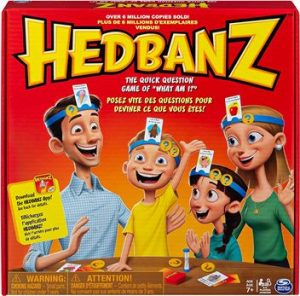 For me, games in the classroom are a must! Growing-up, game night was something my family did and still does. They are a way of not just bringing people together, but many times allow people to be on the same level playing field. In the classroom, this is no different. However, we can choose to be deliberate with what games can teach our students- vocabulary, basic math skills, grammar and even more. As a teacher, games help me to see things in my students that a regular lesson cannot. They answer questions such as how do our students learn directions (reading, listening, doing), how do they help their classmates, and how do they react when winning or losing? All of this can allow for teachers to better understand their students and do what is best for them and their learning. Two of my favorite games to play in the classroom are Hedbanz and Scattergories – the card game. In Hedbanz, students not only work on vocabulary by trying to guess their word but other skills such as asking specific questions to reach their goal. In Scattergories, we can work on vocabulary topics that may not always be taught in the regular curriculum. It is also a great way to see what prior knowledge students have in a subject. You can adapt both of these games by creating your own vocabulary cards that fit what you are teaching in class.
For me, games in the classroom are a must! Growing-up, game night was something my family did and still does. They are a way of not just bringing people together, but many times allow people to be on the same level playing field. In the classroom, this is no different. However, we can choose to be deliberate with what games can teach our students- vocabulary, basic math skills, grammar and even more. As a teacher, games help me to see things in my students that a regular lesson cannot. They answer questions such as how do our students learn directions (reading, listening, doing), how do they help their classmates, and how do they react when winning or losing? All of this can allow for teachers to better understand their students and do what is best for them and their learning. Two of my favorite games to play in the classroom are Hedbanz and Scattergories – the card game. In Hedbanz, students not only work on vocabulary by trying to guess their word but other skills such as asking specific questions to reach their goal. In Scattergories, we can work on vocabulary topics that may not always be taught in the regular curriculum. It is also a great way to see what prior knowledge students have in a subject. You can adapt both of these games by creating your own vocabulary cards that fit what you are teaching in class.
Luigina Finneran is the NJTESOL/NJBE Bilingual/ESL Middle School SIG Representative. She teaches in Fair Lawn.
How to Use Gameplay to Enhance Classroom Learning
By Hoa P. Nguyen 
Hoa Nguyen points out the benefits of using games in the classroom, not to replace other methods of teaching but to enhance them. The benefits are to “increase student participation, foster social and emotional learning, and motivate students to take risks” in addition to making learning enjoyable and improving learning outcomes. Because games require greater student engagement than watching movies or reading books, they can help students broaden their thinking. The author also mentions gamification: using points or badges to encourage students to take more risks and not be fearful of making mistakes. Instead of a letter grade, performance can be described with words such as novice. Other advantages of games are that they encourage collaboration, and students are more willing to try difficult tasks. Games can also be scaffolded or calibrated to match students’ abilities. The author recommends starting with something small with simple rules and using different types of games. Find out more about specific games and the research behind it.
November 1, 2022
Engaging MLs in Daily Academic Conversations
By Jenny Vo 
To build students’ speaking skills, Jenny Vo recommends engaging students in structured conversations about academic subjects. Here is how she describes it. “Structured academic conversation is intentionally planned on the teacher’s part. It has a purpose. It has a focus. It has parameters. It is content-rich. It is sustained.” She delineates step-by-step processes for four strategies that can engage multilingual learners in academic conversations in the classroom.
- Partner Talk or Turn & Talk – This gives students the opportunity to think and talk to a partner before they are called on to answer a question. Vo describes two ways this can be done.
- QSSSA (Questions, Signal, Stem, Share, Assess) This process includes vocabulary, thinking time, sentence stems, discussion with partners, and evaluation of students’ comprehension.
- Talk Read Talk Write – Students discuss the topic, read about it, talk about it with a partner, and then write about what they have learned.
- Sentence Stems – In addition to having these posted in the room, Vo recommends giving students small versions of the charts to attach to their notebooks.
Shared by Hana Prashker, NJTESOL/NJBE Liaison You can see Vo’s classroom charts and details about these strategies here.
5 Problems to Avoid With Role Play in EFL/ESL + Solutions
 By Will
By Will
Role-plays are a wonderful activity for helping students develop fluency, but there can be problems. From experience, the author lists five issues and solutions for them.
- Confusing instructions – Will suggests modeling the role-play so students know what is expected.
- A role-play that is too difficult or too easy – Beginners who cannot put a sentence together cannot role-play, while more advanced students need a challenge.
- Vocabulary issues – Pre-teach words that students do not know but will need for the activity.
- Intervening too much or not enough – Students may need time to think, but teacher input may be necessary to keep the activity going or correct serious errors.
- Having the wrong amount of fun – Children might get silly, so the author recommends setting boundaries. Adults will likely be too serious, so they need to have humor inserted into the activity.
The author concludes that successful role-plays are all about balance. You can find more tips and some scenarios for different ages here.
November 8, 2022
Share Your Success! Call for Proposals for the Spring Conference
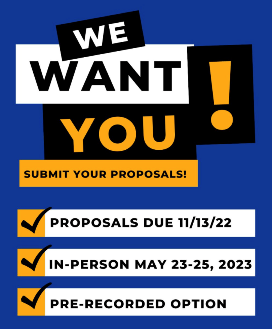 Let other teachers know what works for you and your students. You can present a workshop or a poster session. If you have a good idea, but you are not sure about it, you can reach out to your SIG, Special Interest Group representative, or Caia Schlessinger, the Conference Coordinator. In-Person Presentations will be offered Tuesday, Wednesday, and Thursday, May 23, 24, & 25 at the Hyatt. You will have a total of 75 minutes to present and answer questions. Video Library Presentations are prerecorded sessions 30 to 45 minutes in length. These will be available for participants to watch from May 26th through September 1st. You can also do both! Proposals are due November 13th. You can submit your proposal here. Below are some suggestions for topics.
Let other teachers know what works for you and your students. You can present a workshop or a poster session. If you have a good idea, but you are not sure about it, you can reach out to your SIG, Special Interest Group representative, or Caia Schlessinger, the Conference Coordinator. In-Person Presentations will be offered Tuesday, Wednesday, and Thursday, May 23, 24, & 25 at the Hyatt. You will have a total of 75 minutes to present and answer questions. Video Library Presentations are prerecorded sessions 30 to 45 minutes in length. These will be available for participants to watch from May 26th through September 1st. You can also do both! Proposals are due November 13th. You can submit your proposal here. Below are some suggestions for topics.
Possible Proposal Topics for the Spring Conference
 For our annual NJTESOL/NJBE Spring Conference, we invite proposals that will strengthen collaboration to support our students, their families, educators, support staff, and the communities in which we work and live. Collaboration is at the core of our work and reflected in the 2020 WIDA Standards Framework. Presentations should be current and appropriate as related to the teaching of English to speakers of other languages, Bilingual Education, and Dual language programs including students who are U.S. born bilinguals, ethnically and/or racially diverse multilingual speakers, “generation 1.5”, immigrants, and international students. To promote all voices in our organization and in support of our Spring Conference theme of Strengthening Collaboration we encourage submission of proposals from Black, Indigenous, and people of color (BIPOC) members and/or topics that focus on race and power within language instruction, or linguistic justice more broadly. Presentations may focus on any educational level, from kindergarten to university, as well as adult school and workplace literacy settings.
For our annual NJTESOL/NJBE Spring Conference, we invite proposals that will strengthen collaboration to support our students, their families, educators, support staff, and the communities in which we work and live. Collaboration is at the core of our work and reflected in the 2020 WIDA Standards Framework. Presentations should be current and appropriate as related to the teaching of English to speakers of other languages, Bilingual Education, and Dual language programs including students who are U.S. born bilinguals, ethnically and/or racially diverse multilingual speakers, “generation 1.5”, immigrants, and international students. To promote all voices in our organization and in support of our Spring Conference theme of Strengthening Collaboration we encourage submission of proposals from Black, Indigenous, and people of color (BIPOC) members and/or topics that focus on race and power within language instruction, or linguistic justice more broadly. Presentations may focus on any educational level, from kindergarten to university, as well as adult school and workplace literacy settings.
November 15, 2022 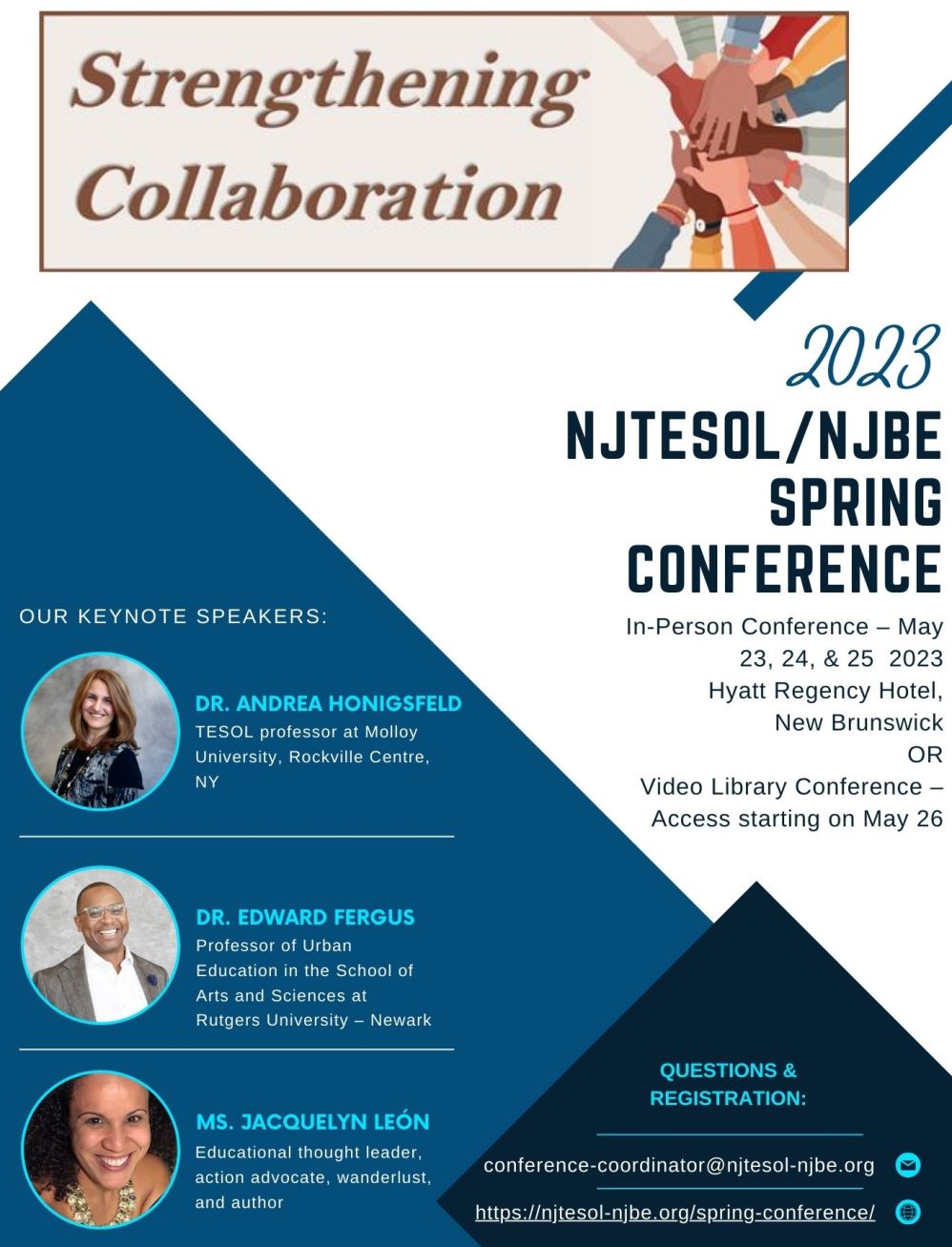
Let’s Talk Turkey: 10 Traditional Thanksgiving Activities for ESL Students
By Susan Verner 
In her downloadable blog for Fluent U, an English educator, Susan Verner lists 10 quick activities to incorporate the Thanksgiving holiday into classroom activities.
- What Are You Thankful for? – First in pairs or small groups, students share what they are thankful for, and then volunteers or one by one, students can share what they’ve discussed with the class. Verner also suggests having students write or draw what they’ve discussed.
- The Perfect Meal – First the teacher talks about the food that is usually eaten on Thanksgiving, and then the students describe traditional meals from their cultures.
- Pass Your Plate – Students write the names and ingredients or draw pictures of what they consider to be a perfect meal on a paper plate.
- The Turkey Bowl – Explain the basic rules of American football and have a Q & A discussion about the game. Phrases for a simple cheer and a game of tag football will make it more exciting.
- Everyone Loves a Parade – Show pictures of the balloons from past Macy’s parades, and have your students talk in groups to decide what characters should be added and why. They might write a letter to the parade planners giving their choices and the reasons for those choices.
- Thanksgiving vocabulary Bingo
- Thanksgiving vocabulary charades or Pictionary
- Thanksgiving Survey – Have students prepare a 3-4 question survey to query other students or adults.
- The Good Old Days – To practice using the past tense, have students find information about the first Thanksgiving, and compare it with the present day.
- Turkey How-to – Watch a video about how to cook a turkey, and then have students explain the process to each other. Vetner also suggests having a real Thanksgiving meal in class if possible.
You can find the details here.
November 22, 2022
5 Handy Go-to Conversation Questions for the ESL Classroom
By Susan Verner  This blog contains a list of five categories of questions with specific questions for each. The author’s premise is that if you ask the right questions, your students will talk. 1. The first group of questions targets specific grammar points such as the past tense or dependent clauses.
This blog contains a list of five categories of questions with specific questions for each. The author’s premise is that if you ask the right questions, your students will talk. 1. The first group of questions targets specific grammar points such as the past tense or dependent clauses.
- What did you do last summer? (simple past)
- What will you do next year? (simple future)
- Questions that begin with “Why…”
- Questions that begin with “How long…”
2. These questions are about specific topics using a K/W/L chart and having them work in groups to fill it out. The topic could be one that is being presented in their class or a general ESL topic such as jobs or sports. 3. The basis for these questions is real-world situations that your students may have encountered eating in a restaurant, shopping, or trying to engage in small talk. Some examples are:
- Have you ever ordered something that turned out not to be what you expected? What did you do?
- What is the strangest thing you have ever eaten in a restaurant?
- How do you like this weather we’re having?
4. The fourth set of questions gives students the opportunity to share their cultures. Included are topics such as their favorite place in their home country or special holidays. 5. The last group is about controversial topics. There is no list for this, but one of the benefits of this is that students can learn good strategies for discussions. See the complete list here.
Trying it out – Using Imitation for Fluency and Vocabulary
By Marilyn Pongracz 
This semester, I tried a few sentence-level fluency-building imitation activities with my high level college ESL writing class. The first essay my students had to write was a narrative. We started by reading a humorous example. After putting the story away, I gave each student a strip of paper with one sentence from the story to divide into four logical parts. They copied the four parts on small pieces of paper I had given them. Then they mixed up the pieces of paper and gave them to a different student who had to put them back into the correct order. After that, they passed the papers on to a second and a third student to put in order. Besides providing focus on sentence structure, this turned out to be a good icebreaker! Finally, following my example, they had to write a similar sentence on a different topic using the syntax of either their original sentence or the last one they had received. This introduced my students to imitation, which they used for subsequent activities.
A few weeks later, for specific vocabulary for compare/contrast essays, I presented an example for each word. We did another example as a class, and afterwards, they had to write their own versions. Another option that I tried for transition words in argumentative essays was to have my students find examples on the internet, copy them, and then write their own versions. They found a wider variety of options than the usual ones presented in textbooks. In the end, there was a degree of success! Many used the vocabulary in their essay tests.
Marilyn Pongracz, the NJTESOL/NJBE Technology Coordinator, is the Supervisor for the Bergen Community College ESL Tutoring Center. She teaches an evening ESL writing class.
November 29, 2022
Identity and Getting to Know Your Students
By Lindsay Bosley
 In the blog Peers and Pedagogy from Achieve the Core, teachers offer tips that they have used successfully. Lindsay Bosley writes about how to make children feel that their identity is special even while meeting academic demands and helping students with their social-emotional development. Besides the welcoming activities at the beginning of the school year, a group of teachers developed monthly goals connected to students’ identities. The activities focused on their families and their traditions. When the students completed their creations, they presented them to their classmates. One activity involved their families’ recipes. Songs and stories are other options that she mentioned. Bosley remarks that “These identity lessons gave students a way to celebrate their own uniqueness and that of their peers. Frequently throughout the school year, children had a chance to celebrate their differences, what makes them special, and the fact that they are valuable members of their classroom group and school.” See more information here.
In the blog Peers and Pedagogy from Achieve the Core, teachers offer tips that they have used successfully. Lindsay Bosley writes about how to make children feel that their identity is special even while meeting academic demands and helping students with their social-emotional development. Besides the welcoming activities at the beginning of the school year, a group of teachers developed monthly goals connected to students’ identities. The activities focused on their families and their traditions. When the students completed their creations, they presented them to their classmates. One activity involved their families’ recipes. Songs and stories are other options that she mentioned. Bosley remarks that “These identity lessons gave students a way to celebrate their own uniqueness and that of their peers. Frequently throughout the school year, children had a chance to celebrate their differences, what makes them special, and the fact that they are valuable members of their classroom group and school.” See more information here.
Read how the pursuit of identity started with a book study, Cultivating Genius by Dr. Gholdy Muhammad.
Students Know Themselves Best
By Anne Tacinelli
 Anne Tacinelli shared the wonderfully positive experience of the identity lesson, “The Best Part of Me.” Her fifth grade class first discussed self-love and being proud of something about themselves. Then they read the book, The Best Part of Me by Wendy Ewald. Tacinelli took pictures of each student’s best part and had them write about it. This activity enlightened her more fully to her students’ identities. Tacinelli wrote, “Having the opportunity to experience this lesson sequence with my students was something I had been missing in my previous years of teaching. Lessons like ‘The Best Part of Me’ have helped to build relationships with my students that truly matter. Trust was developed because of these relationships; with trust comes a strong foundation in the classroom. This led to my students feeling comfortable taking risks as learners throughout the day.” You can read the article here.
Anne Tacinelli shared the wonderfully positive experience of the identity lesson, “The Best Part of Me.” Her fifth grade class first discussed self-love and being proud of something about themselves. Then they read the book, The Best Part of Me by Wendy Ewald. Tacinelli took pictures of each student’s best part and had them write about it. This activity enlightened her more fully to her students’ identities. Tacinelli wrote, “Having the opportunity to experience this lesson sequence with my students was something I had been missing in my previous years of teaching. Lessons like ‘The Best Part of Me’ have helped to build relationships with my students that truly matter. Trust was developed because of these relationships; with trust comes a strong foundation in the classroom. This led to my students feeling comfortable taking risks as learners throughout the day.” You can read the article here.
December 6, 2022
Literacy and New MLLs in U.S. Elementary Schools
By Judie Haynes
 In two of her blogs for international TESOL, Judie Haynes describes approaches for newcomer multilingual learners (MLLs) determined by whether their families are literacy-oriented or non-literacy-oriented families. She writes that “Literacy is a key component of how MLLs adapt to schools in the United States, and it is important for teachers to realize that not all newcomers come to us with the same background, especially when it comes to literacy.” In the first blog, Haynes describes the literacy-oriented family.
In two of her blogs for international TESOL, Judie Haynes describes approaches for newcomer multilingual learners (MLLs) determined by whether their families are literacy-oriented or non-literacy-oriented families. She writes that “Literacy is a key component of how MLLs adapt to schools in the United States, and it is important for teachers to realize that not all newcomers come to us with the same background, especially when it comes to literacy.” In the first blog, Haynes describes the literacy-oriented family.
- Literacy-Oriented Families Prioritize Language and Independent Thinking. The parents have a high level of education and speak, read, and write in both their native language and English. They use advanced vocabulary with their children, read to them, and ask questions that encourage high-order thinking.
- Literacy-Oriented Families Often Value Time. They have adapted to the monochromatic time concept in that they value accomplishing tasks within a given time frame and being punctual for school.
- Literacy-Oriented Families Provide Rich Experiences to Children. These families take their children to museums, parks, zoos, and historical sites. They attend school activities for parents.
Read more about it here. See below for highlights of Judie Haynes’ second blog.
Characteristics of Students from Non-Literacy-Oriented Homes
By Judie Haynes
 Some non-literacy-oriented families may come from a collectivist culture that values the group over the individual. Children form their identity based on their relationships to the group. These children may not have attended school regularly because of a crisis in their home country. These children will probably have difficulty with the demands of school. However, it is important for teachers to focus on these children’s assets.
Some non-literacy-oriented families may come from a collectivist culture that values the group over the individual. Children form their identity based on their relationships to the group. These children may not have attended school regularly because of a crisis in their home country. These children will probably have difficulty with the demands of school. However, it is important for teachers to focus on these children’s assets.
- They have strong oral language skills that enable them to tell detailed stories.
- They have some literacy in their native language.
- Their families are supportive.
- Their experiences can broaden the perspectives of their classmates’ understanding of the world.
While typical ESL programs support students from literacy-oriented families, the approach for students from non-literacy-oriented families needs to be different. Haynes lists five strategies that will help these students succeed.
- Help students and families understand what is expected in the school experience.
- Because of the trauma they have experienced, it is necessary to focus on students’ social-emotional needs.
- Provide instruction in literacy in the students’ native languages and/or English.
- Teach students the vocabulary they will need for the subjects they are studying.
- Match instruction to the students’ cultures by allowing them to collaborate during lessons.
Students’ success “does not have to be the burden of just one teacher. It can involve everyone who works with the students.” Haynes concludes that “For MLLs from non-literacy-oriented backgrounds to be motivated and to have success in school, teachers have to be powerfully dedicated to understanding the backgrounds of such students.” You can find more information here.
Judie Haynes was president of NJTESOL/NJBE 2010-2012. She writes monthly blogs for the TESOL International Association.
12/13/22
Looking at and Learning about the WIDA 2020 Standards Framework with NJTESOL/NJBE
Calling all attendees of previous Look & Learn sessions:
Join us for Session 2: Looking further at the WIDA 2020 Standards Framework (intermediate session) Tuesday January 10th at 4:30
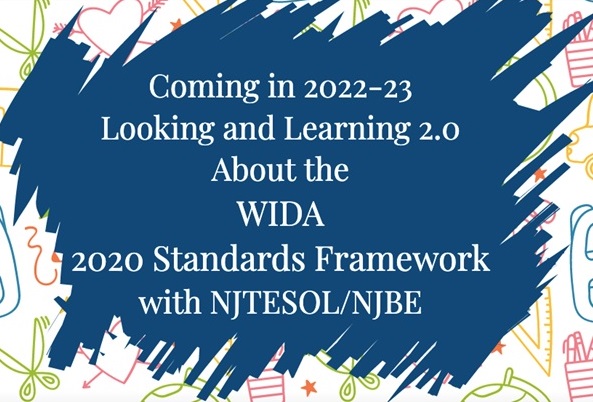
We will be exploring resources and discussing ways to begin implementation. Register for free on Eventbrite.
Look for our last session on February 9, 2023. Registration announcements will be on the NJTESOL/NJBE hotlist, Facebook page, and Twitter.
Padres con Poder/Parent Power
Teachers, have your students’ families register for this important event!
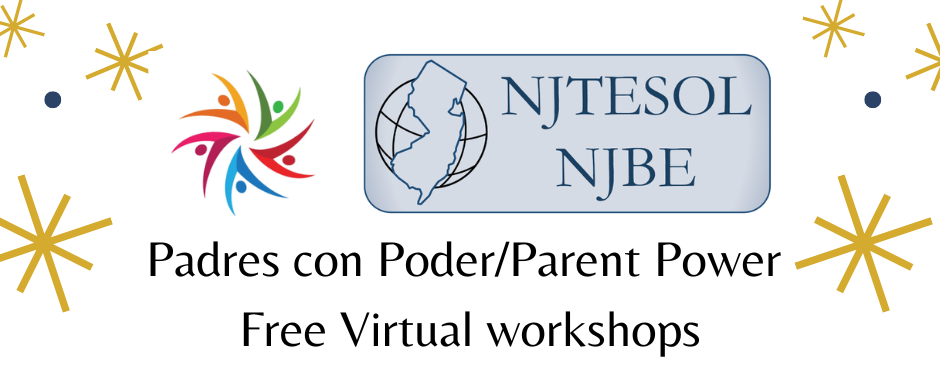
Parent Expo Saturday, January 21, 2023, 9:30-12:00.
This year’s presentations focus on student and family mental health support, a panel on raising a bilingual child, civil rights and immigration information for families, and a presentation by Seal of Biliteracy graduates. Recordings of the presentations will be available in our resources. Gift card drawing and certificates for participants. Register on Eventbrite
Parent Expo Sábado, 21 de enero de 2023, 9:30-12:00.
Las presentaciones de este año se centran en el apoyo a la salud mental de los estudiantes y las familias, un panel sobre cómo criar a un niño bilingüe, información sobre derechos civiles e inmigración para las familias, y una presentación de los graduados del Sello de bilingüe. Las grabaciones de las presentaciones estarán disponibles en nuestros recursos. Sorteo de tarjetas de regalo y certificados para los participantes. Regístrese en Eventbrite
12/20/22

Wishing you and yours a restful holiday break and a happy, healthy new year
NJTESOL/NJBE Weekly Voices will resume January 4, 2022.
Call for Submissions to the Annual Voices Journal
 As we move into the end of the year, it is good to look back and think about our teaching practices, successful collaborations, and research findings; reflections on what has been successful and what has not. Self reflection is a useful tool, but sharing information expands our abilities through sharing knowledge. A great way to share that information is to write an article for NJTESOL/NJBE Voices Journal. This is our annual winter publication, and we are looking for articles from our members now with a submission deadline of January 15. To promote all voices in our organization, we encourage articles from Black, Indigenous, and people of color (BIPOC) members and/or topics that focus on race and power within language instruction, or linguistic justice more broadly. Submission guidelines indicate articles in these categories:
As we move into the end of the year, it is good to look back and think about our teaching practices, successful collaborations, and research findings; reflections on what has been successful and what has not. Self reflection is a useful tool, but sharing information expands our abilities through sharing knowledge. A great way to share that information is to write an article for NJTESOL/NJBE Voices Journal. This is our annual winter publication, and we are looking for articles from our members now with a submission deadline of January 15. To promote all voices in our organization, we encourage articles from Black, Indigenous, and people of color (BIPOC) members and/or topics that focus on race and power within language instruction, or linguistic justice more broadly. Submission guidelines indicate articles in these categories:
- Current issues: a submission for the current issues category should provide a clear analysis, critique, discussion, or presentation of key topics in New Jersey ESL, Bilingual Education, and Dual Language programs.
- Classroom explorations: a submission for the classroom explorations category will enable teachers to share their personal perspectives on their own instructional techniques, challenges, issues, and successes. It should include viewpoints in developing multiple avenues to address the range of issues in ESL, Bilingual Education, Dual Language education, and student learning. Each submission should include the type of program, the instructional techniques, and an overview in the first paragraph, then provide supporting evidence throughout the rest of the article.
- Program descriptions/exemplary scheduling: a submission for this category will detail a school or district program that has created a solution to an issue impacting effective instructional settings for English language learners, bilingual students, and dual language learners. These programs do not need to be all encompassing, but rather provide insight into creative strategies for scheduling and/or lesson planning to enhance student learning.
- Alternative perspectives: a submission in this category will provide an opportunity for diverse perspectives on one issue or topic. We encourage innovative commentary on issues or teaching methodologies as a way of including all voices in a professional conversation.
Articles should be current and appropriate as related to the teaching of English to speakers of other languages, Bilingual Education, and Dual language programs including students who are U.S.-born bilinguals, ethnically and/or racially diverse multilingual speakers, “generation 1.5”, immigrants, and international students. Articles may focus on any educational level, from kindergarten to university/teacher education, as well as on adult school and workplace literacy settings. Article length is recommended to be 500-1200 words and photos are accepted. In recognition of the disproportionate impacts upon Black multilingual language learners, we encourage submissions at the intersection of race and language. Please check the complete guidelines here. NJTESOL/NJBE thrives on the scholarship and teaching skills of its members. Please take the time to share some of your expertise with your colleagues in NJTESOL/NJBE Voices Annual Journal. The deadline for submission is January 15, 2023. Click here for submission information. See last year’s journal. Thank you, Kathleen Fernandez, Executive Director NJTESOL/NJBE
APPROVED! Spring Conference Travel Waiver
 Dear NJTESOL/NJBE Members, Reminder – our application for the travel waiver from the NJDOE was approved! Because of this waiver, school districts, charter schools, and renaissance school projects will be able to reimburse eligible attendees for overnight lodging on May 23 & 24, 2023 only. Please be advised that the waiver of the prohibition for reimbursement for overnight lodging covers only those attendees whose home to event commute exceeds 50 miles. In other words, only those individuals whose one-way commute to the NJTESOL/NJBE’s Spring Conference in New Brunswick, NJ, exceeds 50 miles may obtain reimbursement from their school district, charter school or renaissance school project for overnight lodging for May 23 & 24, 2023. You can find the full waiver on our website: 2023 NJTESOL/NJBE Travel Waiver Daily/overnight self parking at the Hyatt Regency Hotel: $8 Reserve a room at the Hyatt Regency Hotel Calculate tolls on the NJ Turnpike or Garden State Parkway Register here for the Spring Conference – Caia Schlessinger conference-coordinator@njtesol-njbe.org
Dear NJTESOL/NJBE Members, Reminder – our application for the travel waiver from the NJDOE was approved! Because of this waiver, school districts, charter schools, and renaissance school projects will be able to reimburse eligible attendees for overnight lodging on May 23 & 24, 2023 only. Please be advised that the waiver of the prohibition for reimbursement for overnight lodging covers only those attendees whose home to event commute exceeds 50 miles. In other words, only those individuals whose one-way commute to the NJTESOL/NJBE’s Spring Conference in New Brunswick, NJ, exceeds 50 miles may obtain reimbursement from their school district, charter school or renaissance school project for overnight lodging for May 23 & 24, 2023. You can find the full waiver on our website: 2023 NJTESOL/NJBE Travel Waiver Daily/overnight self parking at the Hyatt Regency Hotel: $8 Reserve a room at the Hyatt Regency Hotel Calculate tolls on the NJ Turnpike or Garden State Parkway Register here for the Spring Conference – Caia Schlessinger conference-coordinator@njtesol-njbe.org
Announcements from Fall 2022
9/28/22
Bergen County Chapter – Meeting Thursday, October 6, 2022, 4:30 PM – 5:30 PM, Online
Topic: Communication is Key – Learn strategies to communicate essential information about your ELLs to the school community. You can register here. The link to join the event will be sent out after registration closes at 9:00 pm on October 5, 2022.
Reaching Higher Heights with Scaffolds workshop with Esther Park
Live Zoom session – 4:00 pm to 6:00 pm on November 17th OR
The RECORDED session – available after November 17th.
 Call for proposals and registration are now online for the 2023 NJTESOL/NJBE SPRING CONFERENCE You can choose to attend In-Person at the Hyatt Regency Hotel May 23, 24 & 25 (Tuesday, Wednesday & Thursday) OR Virtual Library Access starting on May 26 through September 1
Call for proposals and registration are now online for the 2023 NJTESOL/NJBE SPRING CONFERENCE You can choose to attend In-Person at the Hyatt Regency Hotel May 23, 24 & 25 (Tuesday, Wednesday & Thursday) OR Virtual Library Access starting on May 26 through September 1
10/11/22
Passaic County Chapter Meeting – Thursday, October 20, 2022, 4:30pm – 5:30pm, Online
Topic: Student Choice with Escape Room & Choose Your Own Adventure Stories – with Katie Zinmeister
Please make sure to visit our EVENTBRITE page to register!
Missed a meeting? Catch the recording on our Youtube channel!
Middlesex Chapter Meeting, Friday, October 21 from 4:30-5:50 PM, Online.
Topic: Strategies/techniques for Instructing MLs by Dr. Del Risco. Click here to register.
10/18/22
Mercer County Chapter, October 20, 2022, 6-7pm online
Proudly presenting Yasmin Hernandez-Manno, Have a dialogue, and learn how to help and support our newcomers
Looking and Learning about the 2020 WIDA Standards Framework with NJTESOL/NJBE
Thursday, October 27 from 4:30-5:30 – Introductory Session
These FREE virtual workshops will provide an overview of the 2020 WIDA Standards Framework with discussions about how to implement them in your classroom. The workshops will not be recorded.
Register on Eventbrite, and make sure you receive a confirmation response at the email address you use for registration. The link for the event will be sent to that email from Eventbrite the night before the session. . Please share our flyer!
Upcoming Events – for members who attend the first session and/or who attended last year’s Looking and Learning sessions: 1/10/2023 from 4:30-5:30 Intermediate Look – 2/9/2022 from 4:30-5:30 Advanced Look
11/1/22
Passaic County Chapter – November 15, 2022, 4:30pm-5:30pm, Online
Sp.Ed Strategies for L’s – with Stephanie Riveros,
Visit the chapter’s EVENTBRITE page to register. Missed a meeting? Catch the recording on their Youtube channel.
William Paterson University 41st Annual Bilingual/ESL Conference
Friday, December 9, 2022, 8:30am-3:30pm, Online via Zoom
Participants will be able to earn professional development hours.
Save the date:
Looking at and Learning about the WIDA 2020 Standards Framework with NJTESOL/NJBE
Tue, January 10, 2023, 4:30 PM – 6:00 PM EST Online – Register here.
11/8/22
NJTESOL/NJBE Advocacy Webinar
Wednesday, November 16, 2022 at 4:30-5:30 PM Online.
Join us for a Webinar presentation of the work the NJTESOL/NJBE Advocacy Committee has done and looks to do this year. Learn how you can become a part of the committee or just support the cause.
11/15/22
Somerset-Hunterdon County First Chapter Meeting of the year, Thursday December 1, 4:30-5:30 virtual meeting.
We will be sharing and discussing each of our school’s ESL curriculum. Click here to RSVP
11/22/22
Happy Thanksgiving from NJTESOL/NJBE! Somerset-Hunterdon County First Chapter Meeting of the year Thursday December 1, 4:30-5:30 virtual meeting. We will be sharing and discussing each of our school’s ESL curriculum. Click here to RSVP
11/29/22
Early registration for the 2023 NJTESOL/NJBE SPRING CONFERENCE You can choose to attend In-Person at the Hyatt Regency Hotel, May 23, 24 & 25 (Tuesday, Wednesday & Thursday) OR Virtual Library, Access starting on May 26 through September 1
Parents of Multilingual Learners join us for Padres con Poder/Parent Power, NJTESOL/NJBE’s FREE Virtual workshop on Saturday, January 21, from 9:30 – 12:30! There will be live presentations, recordings, and an online library of resources available. Topics will include student and family mental health support, a panel on raising a bilingual child, civil rights and immigration information for families, and a presentation by Seal of Biliteracy graduates. Click here to register.
 12/6/22
12/6/22
Shore Chapter PD Event Featuring LeighAnn Matthews Please join us for our first professional development event on December 19 from 5-6pm! Click here to learn more about the event and to register.

